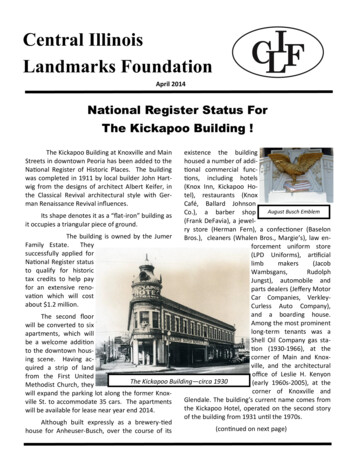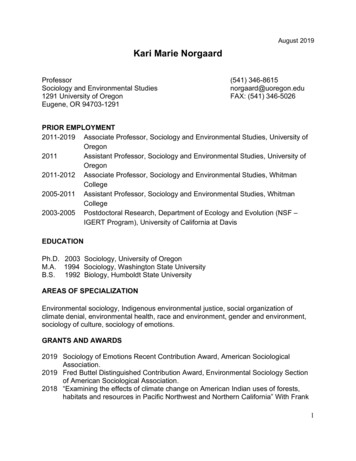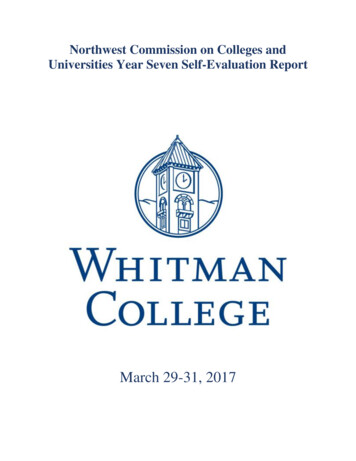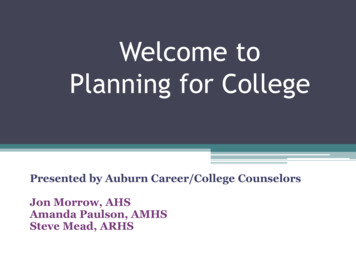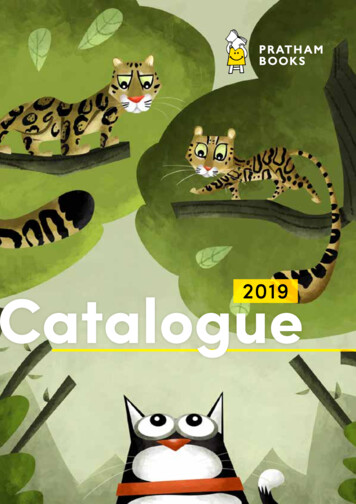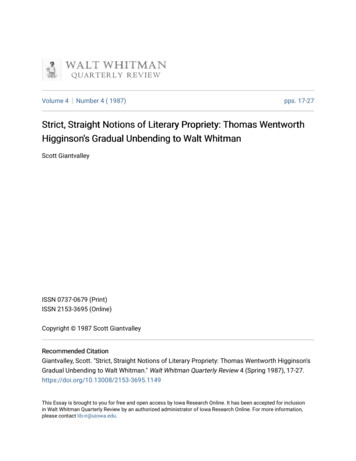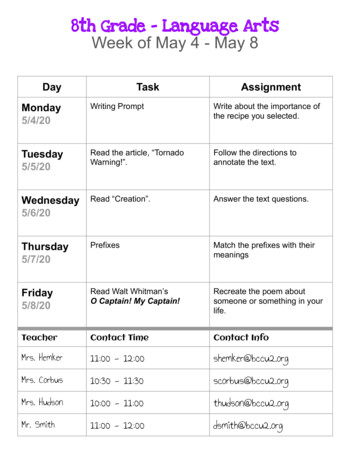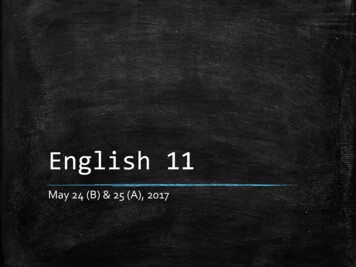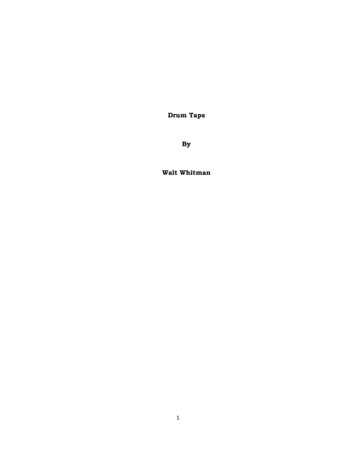
Transcription
EnglishChair: Gaurav MajumdarSharon AlkerTheresa M. DiPasqualeScott ElliottAdam GordonChristopher LeiseMary RaschkoKatrina Roberts (on Sabbatical,2022-2023)Kisha Lewellyn SchlegelAlzada TiptonAffiliated Faculty:Lydia McDermott, Rhetoric, Writingand Public DiscourseThe courses in English provide opportunity for the extensive and intensive study of literature for its aestheticinterest and value and for its historical and general cultural significance. English courses also provide instruction andpractice in writing: some in scholarly and critical writing, others in creative writing.Learning Outcomes – English Major Major-Specific Areas of Knowledgeo Upon graduating, English majors will be able to perform sophisticated close readings ofliterary texts, applying genre-specific literary terminology in demonstrating theirunderstanding of the relationship between form and content. They will be able to demonstratetheir familiarity with various approaches to literary studies, to identify the effects of literaryallusions, and to investigate the relationship between a text and the culture in which it waswritten. Accessing Academic Community/Resourceso They will be able to make good use of library resources and to read and explore literary textsindependently. Critical Thinkingo They will have developed sensitivity to literary aesthetics and style and will be able to analyzetexts and discourses in a variety of media—written, performed, visual, and oral; they will beable to synthesize a broad range of information bearing upon the interpretation of thesediscourses. Communicationo They will be able to think, speak, and write intelligently about what texts do in their variousfunctions. They will speak and write clearly, confidently, persuasively, and with nuance. Research Experienceo They will be capable of writing an extended literary analysis paper supported by primary andsecondary research. They will be capable of identifying literary questions, posing anhypothesis about how the question might be answered, and researching the question throughthe analysis of primary sources and synthesis of secondary sources.Distribution: Courses completed in English apply to the humanities distribution area, with the followingexceptions: Humanities or Cultural Pluralism: 245, 246, 270, 376, and other courses as specified below.Fine Arts: 150, 250, 251, 252, 320, 321, 322, and 389Total credit requirements for the English major: 36The English major: 36 Credits Required Courseso English 290 and 491
ooo One elective at the 100- or 200-level chosen from 176-179, 200, 230-233, 245, 246, 250-252, or270At least three other 200- or 300-level courses meeting specific requirements One early period British literature course, chosen from English 335, 336, 337, 338, 350,or 357 One course in American literature, chosen from 347, 348, or 349 One course in underrepresented literatures, chosen from 245, 246, 270, 346, 376, oranother course identified as counting in this categoryThree electives at the 300- or 400-level One of the electives may, with the written approval of the English Department, be aliterature course at the 300-level or higher offered by another department on campusOther noteso No course may satisfy more than one requiremento No more than two Creative Writing courses may be counted toward the majoro No more than 12 credits earned in off-campus programs, transfer credits, credits from coursesoffered by other Whitman departments, or cross-listed courses may be used to satisfy majorrequirementso Courses used to satisfy requirements in other majors or minors cannot also be used to satisfyrequirements in the English major or minoro Strongly recommends two years of foreign language, especially for those considering graduateschoolo No courses may be taken PDFSenior Requirementso English 491o One-hour oral examo Revised seminar paper; graded by two to three facultyHonorso Students do not apply for admission to candidacy for honorso Students must submit a proposal for their thesis or project Must be submitted within the first six weeks of the two-semester period in which studentis eligibleo Accumulated at least 87 creditso Completed two semesters of residency at Whitmano Cumulative GPA of at least 3.300 on all credits earned at Whitman Collegeo Major GPA of at least 3.500o Complete a written thesis or research project prepared exclusively for the satisfaction of thisprogramo Earn a grade of at least A- on the honors thesis or project and the honors thesis courseo Pass the senior assessment with distinctiono Chair of the department will notify the Registrar of students attaining Honors no later than thebeginning of week 12 of the semestero An acceptable digital copy of the Honors Thesis must be submitted to Penrose Library no laterthan Reading DayThe English minor: 20 Credits Required Courses
One elective from 176-179, 200, 230-233, 245, 246, 250-252, 270, or 290o At least three other 200-or-300-level courses meeting specific requirements One early period British literature course, chosen from English 335, 336, 337, 338, 350,or 357 One course in American literature, chosen from 347, 348, or 349 One course in underrepresented literatures, chosen from 245, 246, 270, 376, or anothercourse identified as counting in this categoryo One elective at the 300-400 levelOther noteso No course can satisfy more than one requiremento No PDF courses for minoro The Creative Writing minor: 20 Credits Required Courseso English 150o One literature course in Englisho Two courses in one of the following genres English 250 and 320 (Fiction) English 251 and 321 (Poetry) English 252 and 322 (Creative Nonfiction)o One creative writing elective at the 200 or 300 level Other noteso If majoring in English and minoring in Creative Writing, one creative writing and one literaturecourse may count toward botho No courses may be taken PDFFor courses in expository writing: See Rhetoric, Writing and Public Discourse 170, 210, and 320.COURSES IN LITERATURE AND THEORY176 Introduction to Creative NonfictionNot offered 2022-234 creditsA study of the forms, techniques, and traditions of a shape-shifting genre that can be understood as arising from thelong tradition of the “essay.” Creative Nonfiction includes forms as diverse as the lyric essay, memoir, profile,critique, rant, and review; inspired and researched, it is a form that transforms lived experience into literary art. Thecourse will explore the writings of literary essayists from antiquity to the present.177 Introduction to PoetryFall, SpringA. Gordon, Staff4 creditsA study of the forms, strategies, voices, and visions of poetry across time. An ever-changing art form related tosong, poetry predates literacy; today, through imagery, implication, indirection, and other means, poems continue tooffer writers and readers ways to give voice to the ineffable. We will examine how poetic form and content interact,and consider the unique powers and possibilities of poetry’s metaphoric language to address all aspects of life.
178 Introduction to FictionNot offered 2022-234 creditsA study of the forms, techniques, and traditions of fiction across time. Fiction has been said to be a means ofimaginative escape, a way to gain deeper understanding of the external world, “the lie through which we tell thetruth,” and a way to acquire a deep empathy for others. This course will explore the complex power of fiction in avariety of manifestations, from the short story to the novella and the novel.179 Introduction to DramaNot offered 2022-234 creditsA study of plays as literary texts, examining the forms and techniques of drama across cultures and time periods. Wewill consider the dynamics of reading (as opposed to watching) plays and will discuss how dramatic texts aredeveloped and interpreted through performance.200 Introduction to Literature and the Humanities4 creditsThe study of selected texts in the humanities, with particular attention to literature written in English, offered at theintroductory level and designed to fulfill the humanities distribution requirement. These courses are writingintensive (involving at least 18 pages of formal, graded writing assignments and including instruction in academicwriting) and involve a substantial amount of reading. Subjects for the section change from semester to semester andyear to year in order to provide students with a variety of choices for literary study at the 200-level. Any currentofferings follow.200-A VT: American HorrorFallA. Gordon4 creditsWhat draws us to horror? From haunted houses to slasher films, gothic novels to teen vampire fiction,mindless zombies to maniacal psychopaths, the passion for scary stories has remained an indelible part ofAmerican culture, reflecting our anxieties back to us. This course takes a closer look at the tradition ofhorror in American culture, from 18th-century accounts of the Salem Witch Trials to twenty-first centurypandemic films broadcast entirely on Zoom; classic tales by Poe, Charlotte Perkins Gilman, and HenryJames to weird fiction by H. P. Lovecraft and Caitlín Kiernan; mid-century horror by Shirley Jackson andRichard Matheson, to recent masters of the form like Clive Barker, Stephen King, and Carmen MariaMachado. We’ll also watch several films by directors such as John Carpenter and Jordan Peele,complementing these primary texts with theoretical readings on the nature of horror, from the romanticphilosophy of the gothic to Freud’s uncanny, Todorov on the fantastic to Kristeva’s abjection. Finally, thecourse will interrogate canons of taste and art, highbrow and lowbrow, respectable “literary” fiction versusdisparaged mass-market genre fiction. When you’re done reading for the night, you might want to leave thelight on. May be taken for credit toward the Film and Media Studies major or minor. Distribution area:humanities.200-B VT: Reading the AnthropoceneFallK. Schlegel4 creditsFor twenty years, the word “Anthropocene” has emerged as both a catalyzing term and a signifier for anurgent reality. As Robert Macfarlane writes, “[this] new epoch of geological time in which human activityis considered such a powerful influence on the environment, climate, and ecology of the planet will leavea long-term signature in the strata record. And what a signature it will be.” In this course, we’ll readliterature that contends with the signature of human impact on the earth. As we consider how literatureshapes our understanding of the Anthropocene, we’ll also consider how the Anthropocene might shape ourunderstanding of literature and literary studies. How does the Anthropocene require—or allow—us to readdifferently? We’ll read across genres and regularly connect with nature in ways that are accessible to allstudents. Inspired by the ecology itself and Jedediah Purdy’s idea that, “the Anthropocene future is,
unavoidably, a collective human project,” the course will culminate in a collaborative project devised bythe students. Distribution area: humanities.200-C VT: Shifting Grounds: Writing, Exile, and MigrancySpringMajumdar4 creditsHow do displacement, difference, and transfer mark the work of migrant writers? What kinds of culturalcontests, exchange, violence, and absorption do these works portray as products of migration? How do theyshow people negotiating these processes at times of massive social and technological change? How do theaesthetics of border-crossing writers themselves reflect the conditions of migration? We will address suchquestions through a study of anxious introspection, contempt, anger, melancholy, and irony, as well asattitudes to cultural confusion and mixture, in works by Joseph Conrad, Elizabeth Bishop, GeorgeLamming, Derek Walcott, Salman Rushdie, Colm Tóibín, Edward Said, and Edwidge Danticat.Distribution area: cultural pluralism or humanities.200-D VT: Solving Wicked Problems: Technology, Literature, and the BrainSpringAlker4 creditsWicked problems proliferate everywhere, from climate change to public policy, education, health,discrimination and political polarization; wicked problems are complex, contradictory and dynamic and donot fit tidy disciplinary categories. Technology is often seen as a key source of solutions, but, as we haveseen over the last decade, it often brings with it biases, problematic algorithms, and ethical dilemmas. Thiscourse posits culture, and literature in particular, as a way to productively study and assess wickedproblems and potential technological solutions. Since Mary Shelley penned Frankenstein and The Last Manin the early nineteenth century, literature has invited its readers to think deeply about new technologies, itspossibilities and its dangers, enabling readers to model possible scenarios and evaluate risk, to placetechnology within the context of the human condition. This course will begin with Bram Stoker’s Draculaand its response to technology of the Victorian era and will then move to a plethora of recent literary worksthat engage with postmodern technology. This course has no prerequisites and invites students interested inall disciplines to participate. Readings will include literary works by such authors as: Charles Dickens, IanMcEwan, Susanna Clark, Patricia Lockwood, and Nnedi Okorafor. During discussions of these texts wewill consider a variety of theories about how reading literature increases the imaginative capacity of thebrain, and about the relationship between technology, culture, and ethics including concepts from suchbooks as: Sheila Jasanoff's Ethics of Invention, Adam Greenfield's Radical Technologies: the Design ofEveryday Life, Safiya Umoja Noble's Algorithms of Oppression, Paul B. Armstrong's How Literature Playswith the Brain, and Shoshana Zuboff's Surveillance Capitalism. May be taken for credit toward the Filmand Media Studies major or minor. Distribution area: humanities.230 Introduction to Shakespeare: Love, Sex, and GenderNot offered 2022-234 creditsFrom Lysander’s “The course of true love never did run smooth!” to Lady Macbeth’s “Come, you spirits / That tendon mortal thoughts, unsex me here,” Shakespeare’s plays and poems grapple with erotic love, human sexuality, andthe complex workings of gender in human experience. Writing for the English stage during a period when femaleroles were played by male actors, Shakespeare often explored the ways in which gender is constructed andperformed, yet his writings also include archetypes of masculinity and femininity; and he fashions lovers whosepassions and desires range from the sublime to the ridiculous. The course will introduce students to college-levelstudy of Shakespeare’s poetry and plays, with particular attention to the themes of love, sex, and gender. May betaken for credit toward the Gender Studies major or minor.
231 Introduction to Shakespeare: Race, Nationality, and PowerNot offered 2022-234 credits“What ish my nation? Who talks of my nation?” asks the enraged Irish captain MacMorris, speaking in dialect as heconfronts the Welsh captain Fluellen in Shakespeare’s Henry V. Not only in his history plays, but in his comedies,tragedies, and romances, Shakespeare explores both how race, ethnicity, and nationality are constructed and howthese concepts shape individual identities and social interactions. Shakespeare not only worked to define what itmeant to be “English” in the late sixteenth and early seventeenth centuries, but helped to shape the English languageitself—which only a tiny percentage of the world’s population spoke at the time he wrote his plays—into England’smost powerful global export. The course will introduce students to college-level study of Shakespeare’s poetry andplays, with particular attention to the themes of race, nationality, and power. May be taken for credit toward theRace & Ethnic Studies major or minor.232 Introduction to Shakespeare: Work, Wealth, and StatusNot offered 2022-234 credits“Some are born great, some achieve greatness, and some have greatness thrust upon ’em.” This mock proverbtempts Twelfth Night’s Malvolio to fantasize about social mobility—an ambition met with comic but humiliatingridicule. Across his works, Shakespeare interrogates the social, economic, and gendered structures that stratifiedearly modern communities. He examines various modes of service, leadership, and artistry, including the craft ofpoetry. Mixing high art with realism and humor, he labors to engage diverse audiences, ranging from those whostand in the yard to those so wealthy that they can pay to sit on the stage. The course will introduce students tocollege-level study of Shakespeare’s poetry and plays, with particular attention to the themes of work, wealth, andstatus.233 Introduction to Shakespeare: Faith, Fate, and VirtueNot offered 2022-234 credits“Who can control his fate?” Othello asks in his last moments upon the stage, after falling prey to Iago’smanipulations and punishing his wife for imagined sins. Throughout his plays, Shakespeare repeatedly grapples withquestions related to belief and power. In tragedy, comedy, and romance, he explores the boundaries between theworldly and the supernatural, as well as the limits of free will. Interweaving politics and religion, ethics andphilosophy, Shakespeare’s texts confront audiences with the existential and moral dilemmas that make us human.The course will introduce students to college-level study of Shakespeare’s poetry and plays, with particular attentionto the themes of faith, fate, and virtue.245 Native American LiteraturesFallLeise4 creditsA survey of writing by indigenous peoples of the present-day United States. This reading-heavy course will focus itsattention on a small number of distinctive indigenous literary traditions, possibly (but not necessarily) including theIroquois confederacy of the U.S. Northeast and southeastern Canada, the Creek nation of the U.S. Southeast, theKiowa peoples of the Southwest, and the peoples of the Columbia Plateau. Aside from reading, assignments willinclude exams and formal essays. May be taken for credit toward the Race & Ethnic Studies major or minor. May betaken for credit toward the major's "Underrepresented Literatures" requirement. This class also fulfills a requirementfor Environmental Humanities. Distribution area: humanities or cultural pluralism.246 Introduction to African American LiteratureNot offered 2022-234 creditsA study of the forms, techniques, and traditions shared by Black writers in colonial America and the U.S. from theearliest known writing in the Eighteenth Century to the present. Topics will include the way Black writers(especially enslaved and formerly enslaved persons) forged spaces for expression in the American public sphere,debates about the appropriate qualities and purposes of “Negro Literature” in the early 20 th century, the innovationsand explorations of the Black Arts Movement, and representations of history and identity pertaining to African
Americans in the wake of the Civil Rights Act. Aside from reading, assignments will include exams and formalessays. May be taken for credit toward the Race and Ethnic Studies major or minor. Distribution area: humanities orcultural pluralism.270 Special Topics in Underrepresented Literatures4 creditsCourses will cover one area of underrepresented literatures in depth. Any current offerings follow.290 Approaches to the Study of LiteratureFall, SpringFall: Leise, Majumdar; Spring: A. Gordon 4 creditsA course in practical criticism designed to introduce students to some of the approaches that can be used in literaryanalysis. Distribution area: humanities.335-341 Studies in British Literature4 creditsCourses designed to introduce students to the literature and culture of England in each of six literary periods: theMiddle Ages (English 336), the Renaissance (English 337), the Restoration and 18th Century (English 338), theRomantic Period (English 339), the Victorian Period (English 340), and 1900-Present (English 341). Also includedin this category are courses covering in depth particular topics in pre-Romantic English literature (English 335). Thespecific focus of each course will vary from year to year. Topics in a particular literary period may be taken a totalof two times, but the second will count as an elective. Any current offerings follow.336 VT: Medieval Literature-Communities and Individuals, Unity and DisunityFallTipton4 creditsIn this course, we will read a wide range of medieval English literature, especially focusing on the varyingforms of community represented within these texts. These communities include early medieval warriorbands, the chivalric knights of the Arthurian legends, religious communities of nuns, monks, and friars, andthe professional communities of the late medieval towns, the guilds. A modern stereotype of the MiddleAges is that medieval communities were a totalizing phenomenon, completely encompassing anindividual’s identity and experience. This is sometimes offered as a contrast to modern life’s putative lackof community. Somewhat related is the incorrect assumption by some that the Middle Ages was culturallyhomogenous, recently used in ways that are harmful to our current community/communities. We willexamine the literature in order to gain a better and more accurate perspective on community in the MiddleAges and in our own era. We will have fun reading the wonderfully weird literature of the era and we willenjoy the great variety of genres, including prose, poetry, and drama. No experience reading medievalliterature is necessary, and we will focus on the opportunities for expanding the skills of close reading andpersuasive writing that medieval literature provides. Distribution areas: humanities.337 VT: Warriors, Queens, and Enchanters: Elizabethan PoetrySpringDiPasquale4 creditsIn the poetry of Elizabethan England, as in our own time, imaginative fictions both mirror reality anddistort it; poetry is shaped by history but also gives birth to it. Beginning with an exploration of how QueenElizabeth I represented herself in writings and speeches throughout her reign, we will then turn to lateElizabethan poetry—poems written during the later years of the Virgin queen’s long reign, including piecesby Ralegh, Donne, and the Countess of Pembroke. We’ll focus particularly on Edmund Spenser’s lush epicromance The Faerie Queene. Dedicated to Elizabeth, Spenser’s richly textured tale of knights andsorceresses, monsters and princesses is delightful in its own right. But it’s also a complex moral, historicaland religious allegory. To read it is to enter into a magical world of the imagination and, at the same time,to immerse oneself in the realm of Elizabeth. Recommended prerequisite: One 100- or 200-level literaturecourse. Distribution area: humanities.
339 VT: Romantic Poetry: Literary RevolutionsFallAlker4 creditsThis class will explore the reconstruction of poetic genres by the major Romantic poets (Wordsworth,Blake, Coleridge, Shelley, Keats, Byron) in response to literary, cultural, and political revolutions. We willplace their work in their historical context, looking at how their poetic theories interact with and resist theworks of their literary predecessors, paying particular attention to the representations of the natural andsupernatural worlds. The Romantic poets did not write in a void, so we will place the work of theRomantics alongside the diverse voices of many of their contemporaries. The emergent voices with whichwe will engage will include working-class poetry; regional poetry; the work of women writers; abolitionistpoetry; and antiquarian and gothic poetry. Distribution area: humanities.341 VT: Modernist Deviance and its LegaciesFallMajumdar4 creditsAs modernism offers several shocks to aesthetic conventions, it also revises moral orthodoxy. We willconsider literary revisions of different kinds of propriety, while studying various factors that provoked thecondemnation of modernist texts as dangerous or ethically “deviant.” Further, the class will trace thelegacies of modernist deviance in contemporary literature, in a film by Terry Gilliam, and in excerpts fromBritish popular music. Distribution area: humanities.346 African American Historiographic FictionFallLeise4 creditsHistoriography involves examining how facts, people, and events get crafted into narratives, as well as how thosestories are interpreted and perpetuated or revised over time. This class will focus on 20th- and 21st-century novelsby African American writers that call attention to specific elements of America’s complex history; we will payparticular attention to the ways the selected books reintroduce overlooked figures and under-covered ideas andoccurrences, recalling or re-imagining often surprising ways of being in community, of seeing the world, and ofliving expansively at various points of American history. While there are no prerequisites, some familiarity withAfrican American writing or English 246 is suggested. May be taken for credit toward the major’s“Underrepresented Literatures” requirement. May be taken for credit toward the Race and Ethnic Studies major orminor.347-349 Studies in American Literature4 creditsOne special topics course, ENGL 347, with a topic that will vary every year, will examine one area of Americanliterature in depth. ENGL 348 covers early and middle American literature. ENGL 349 covers rotating VariableTopics on major movements in modern and contemporary American writing in alternating years: one focuses onliterary representations of the built environment, and the other considers literature influenced by or addressingChristianity and Christian themes. Topics in a particular literary period may be taken a total of two times, but thesecond will count as an elective Any current offerings follow.347 VT: American Protest LiteratureSpringA. Gordon4 creditsThis course examines the long history of American protest literature to ask how literature has promotedsocial justice in the past and how it might continue to do so in the future. Spanning centuries, we’ll ask aseries of fundamental questions: How does literature effect social and political change? How have authorsconceived of the activist potential of fiction and poetry? How might literature offer us a history of socialmovements? To navigate these questions, we’ll read texts by a range of authors from Harriet BeecherStowe, Henry David Thoreau, and Charlotte Perkins Gilman to John Steinbeck, James Baldwin, AudreLorde, and Tony Kushner. Concluding with works like Claudia Rankine’s Citizen, Paul Beatty’s The
Sellout, and hip hop by Kendrick Lamar, Beyoncé, and others, we’ll ask what a literature of resistancemight look like in the twenty-first century. Distribution area: humanities.348 The American Literary Emergence, 1620 - 1920FallA. Gordon4 creditsBeginning with the pre-Revolutionary texts by those newly arrived to the Atlantic Coast colonies, and including thewritings of those already present on the continent, we will study how an “American” literature came into being. Asthe population boomed and expansion moved westward, the newly formed United States became a national entityand global presence. We will study the development of American individualism, the rise of genres such as thecaptivity narrative and the slave narrative, and major literary movements such as the shift to realism and naturalism.Authors may include Bradstreet, Emerson, Douglass, Hawthorne, Whitman, Twain, Wharton, James, Dunbar, andmany more. Distribution area: humanities.349 VT: American Literature of the Modern and Contemporary EnvironmentSpringLeise4 creditsA study of select American literary works across genres that consider how humans have influenced andbeen influenced by changes to our physical environments, as well as how we talk about and name oureffects on this planet (i.e., “public works” and “infrastructure”). Topics may include Anglo-normativenotions of land “improvement”; the effects of fencing, railroads, and paved streets on communities andnationhood; our dependence on electrification and creation of the electrical grid, especially including riverdams; the development of container shipping and the advancement of globalization; and how we live withour trash. In all cases, we will consider how US modifications of the “natural” world affect minoritizedpopulations and peoples, as well as major movements including modernism and postmodernism. Authorsmay include H.D., Elizabeth Bishop, Ken Kesey, Colson Whitehead, Robert Hohn, Ruth Ozeki, ElizabethBradfield, Karen Russell, and others. Distribution area: humanities.350 ChaucerNot offered 2022-234 creditsA study of medieval England’s most famous, influential, and humorous poet. Course texts will include TheCanterbury Tales, Troilus and Criseyde, and select shorter poems. Students will learn to read texts in the originalMiddle English. May be taken to count toward the major’s “Early Period British Literature” requirement.Distribution area: humanities.353 Studies In Shakespeare4 creditsA course on the dramatic and non-dramatic works of William Shakespeare, the course will focus on close reading ofthe primary texts, with attention to questions arising both from the Early Modern English culture in which they werewritten and to their cross-cultural significance in later literature, Theater, and film. The course will vary from year toyear and will be organized by theme. Any current offerings follow:353 VT: Magic, Witchcraft, and the Supernatural in Shakespeare’s PlaysSpringDiPasquale4 creditsTheatre is a form of magic, and dramatic literature is its book of spells. William Shakespeare was a skilledmagician, a sorcerer whose dramatic conjuring continues to entrance readers and audiences. In this course,we will study the rhetorical sleight of hand, dramaturgical illusions, and poetic wizardry underlying suchplays as A Midsummer Night’s Dream, Richard III, Macbeth, and The Tempest, as well as elem
o No PDF courses for minor The Creative Writing minor: 20 Credits Required Courses o English 150 . from the short story to the novella and the novel. . Richard Matheson, to recent masters of the form like Clive Barker, Stephen King, and Carmen Maria Machado. We'll also watch several films by directors such as John Carpenter and Jordan Peele,
